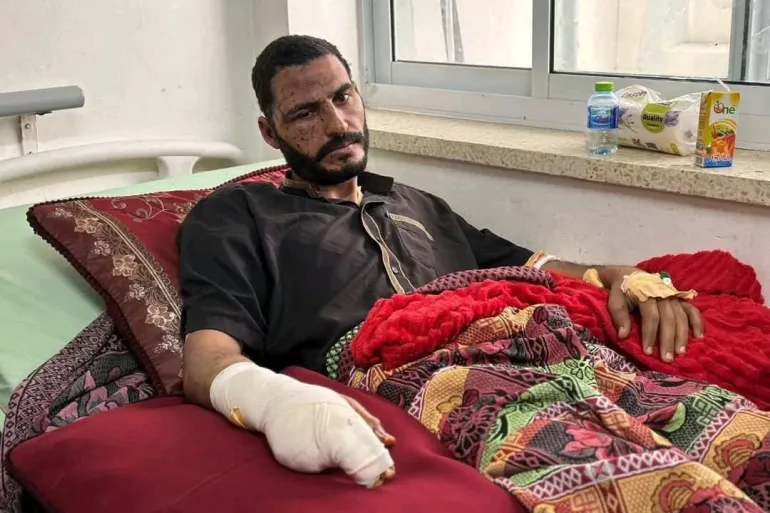"لا يمكن أن يتفق اثنان على كرهه"، "صاحب الخبر الموثوق"، "لن تنجب فلسطين مثله"، "عملة نادرة لن تتكرر".. بطل هذا التقرير مصور صحفي من قطاع غزة، كان معروفا أنه على قائمة الاغتيالات الإسرائيلية منذ أول يوم من الحرب المستمرة على القطاع؛ حيث شن عليه الإعلام الإسرائيلي حملة شيطنة وتحريض وهُدد بالقتل مرات عديدة على منصاته الرقمية من حسابات مزيفة، لكنه واصل عمله تحت القصف والنيران حتى أُسكِتت قنواته الصحفية للأبد بعدما اغتاله جيش الاحتلال بطائرة مسيّرة فجر اليوم الثالث عشر من مايو/ أيار عام 2025، بينما كان يتلقى العلاج على سرير المرض في قسم الحروق بمستشفى ناصر الطبي في خان يونس؛ إنه الشهيد المصور الصحفي حسن إصليح الذي بكاه الجميع في غزة بعد رحيله.
وكالة أنباء متنقلة
بدأ اسم حسن إصليح في الظهور خلال الحرب الإسرائيلية على قطاع غزة نهاية عام 2008-2009؛ حيث كان يعمل حينها مصوراً صحفياً لصالح فضائية القدس. في تلك المرحلة، أسّس صفحة على فيسبوك، كبرت تلك الصفحة بفضل ما ينشره حسن باستمرار من صور وتقارير عن الأحداث التي كان يغطيها بشكل يومي، ومع الوقت أصبحت صفحته القناة الأولى التي يتابعها الفلسطينيون لمعرفة التطورات في قطاع غزة خاصة في فترات الحرب.
نمت صفحات حسن الرقمية، وتنوعت بين إنستغرام وتلغرام وتويتر وغيرها، وفي أثناء الحرب الأخيرة المتواصلة على قطاع غزة بلغ عدد المتابعين لقنواته الملايين. ورغم محاربة صفحاته الرقمية متأرجحةً بين الإغلاق والاختراق والتهديد المستمر بالقتل، إلا أنه واصل توثيق مجريات الأحداث بغزة أولاً بأول.
ياسر قديح مصور وصحفي عرف إصليح لأكثر من عقد، يقول إن أكثر ما يميز حسن عن غيره "أنه كان يحظى بشبكة علاقات متينة جداً مع المؤسسات الحكومية والخاصة والدولية والإغاثية، كما كان يحظى بقبول من جميع الفصائل السياسية وعامة الناس، لذلك كان الأسرع في نقل الأخبار والتصريحات والصور من الميادين كافة، حتى أصبح مصدراً موثوقاً لدى الجمهور الفلسطيني الذي أطلق عليه صفة "وكالة الأنباء المتنقلة".
ياسر قديح مصور وصحفي عرف إصليح لأكثر من عقد، يقول إن أكثر ما يميز حسن عن غيره "أنه كان يحظى بشبكة علاقات متينة جداً مع المؤسسات الحكومية والخاصة والدولية والإغاثية، كما كان يحظى بقبول من جميع الفصائل السياسية وعامة الناس، لذلك كان الأسرع في نقل الأخبار والتصريحات والصور من الميادين كافة، حتى أصبح مصدراً موثوقاً لدى الجمهور الفلسطيني الذي أطلق عليه صفة "وكالة الأنباء المتنقلة".
ويتابع قديح: "كان حسن محبوباً من السياسي والإنسان العادي، أينما يضع قدمه فله مقامه، يعيش مع الناس في كل ظروفهم"، أما الصحفي أشرف أبو عمرة فيؤكد أن "حسن عملة نادرة جدا في المشهد الصحفي العربي، كان يمثل مصدر الخبر الموثوق عندنا، إذا أردنا التأكد من أمر ما نذهب مباشرة لمنصاته الرقمية".
شيطنة حسن وملاحقته
شن الإعلام العبري حرباً ممنهجة على حسن إصليح منذ بداية الحرب الحالية على قطاع غزة، أما الخطيئة التي ارتكبها من منظوره فهي أنه كان من بين المصورين الأوائل الذين غطوا الأحداث في غلاف قطاع غزة يوم السابع من أكتوبر، والتقط صورة شخصية مع دبابة محترقة في المكان، وكان ذلك كفيلاً بفتح الحرب عليه من أوسع أبوابها، ونبش أرشيفه الصحفي على منصاته الرقمية حتى وصلوا إلى صورة تجمعه بيحيى السنوار، حيث ظهر فيها السنوار مقبِّلاً خدَّ حسن، فسارعت إسرائيل لاتهامه بالعمل لصالح حركة حماس.
تسببت تلك الهجمة بأزمة نفسية ومهنية لحسن كما يؤكد أصدقاؤه المقربون منه؛ فأوقفت العديد من المؤسسات الدولية - التي كان يعمل حسن لصالحها بنظام الفريلانس - التعاون معه. حاول حسن الدفاع عن نفسه بالأدلة دون جدوى؛ وذلك لتأثرها بالضغوطات والرواية الإسرائيلية وفق ما قاله المصور محمد فايق الذي رافق حسن طيلة أيام الحرب. يقول فايق إن حسن كان يردد: "لماذا يعاقبونني على عملي الصحفي ويتهمونني بأشياء غير موجودة، بينما يشارك الصحفيون الإسرائيليون في جرائم الإبادة وتفجير منازل المدنيين دون أن يتحدث أحد عن جرائمهم؟!"
تعرض حسن لتهديد مباشر عبر منصاته الرقمية وسُرقت حساباته، ومع ذلك لم يتوقف يوماً عن العمل بل كان يتحرك بسيارته الشخصية تحت القصف والتحليق المكثف للمسيرات والطيران الحربي الإسرائيلي لنقل الأحداث أولاً بأول بينما استُهدف بيته ودُمِّر بشكل كامل خلال الحرب، ونزحت عائلته عدة مرات وهي تعيش حالياً في الخيام.
يستذكر قديح وفايق وأبو عمرة في تصريحات لـ "مجلة الصحافة" بعض المقولات التي كان يرددها حسن رداً على الهجمة الممنهجة ضده، مثل: "لن يحصل إلا ما كتبه الله لي، لن أيأس، لن أمنحهم مرادهم، يرويدون قتلي لأنني مصور صحفي، فليقتلوني وأنا على رأس عملي".
في نيسان/ أبريل 2025، استَهدف الاحتلال حسن إصليح أول مرة عندما أحرق طيران الاحتلال خيمة الصحفيين التي كان يعمل حسن بداخلها، واستشهد فيها الصحفي أحمد منصور حرقا على البث المباشر، أما حسن ففقد اثنين من أصابعه وظل يتلقى العلاج داخل المستشفى إلى أن اغتاله الاحتلال هناك. يقول فايق: "لم نر أحداً بشجاعته وجرأته؛ كان كثيرون ينصحونه بعدم الخروج للتغطيات بسبب تهديدات الاحتلال له، لكنه كان مغامراً ويخرج لأماكن القصف والاستهداف".
كان حسن صوتاً للطبقة المهمشة والفقراء والمساكين، بصيص أمل للنازحين والمكلومين، بسببه تحققت العشرات من المناشدات وخرج كثير من المرضى من قطاع غزة لتلقي العلاج، لقد ترك بصمة في كل أنحاء قطاع غزة وفي كل الميادين".
مصور الناس المحبوب
يؤكد أصدقاء حسن أن الشهيد كان يقضي معظم ساعات اليوم متنقلاً من مكان إلى مكان لتوثيق الأحداث ونقل مناشدات الناس الإنسانية في محاولة لمساعدتهم، لدرجة أن عائلته (زوجته و5 أبناء) كانت تتذمر من قلة رؤيته. يقول المصور قديح إنَّ "حياة حسن كانت مرتبطة بالمواقف الإنسانية وتقديم العون للناس، تحديداً للنساء الأرامل وكبار السن والأيتام وأهالي الشهداء والنازحين والمرضى الذين لا يجدون علاجاً في قطاع غزة. يتابع قديح: "عندما كنا نحن الصحفيين نذهب مع حسن في سيارته إلى التغطيات الصحفية، كنا نعاني بشدة من التأخر في الوصول إلى مكان الحدث لكثرة الناس الذين يريدون إلقاء التحية عليه والتقاط الصور معه؛ فقد كان يحظى بقبول غير طبيعي".
من الجوانب الخفية التي يكشف عنها فايق لمجلة الصحافة أن إصليح كان "كتوما" في عمل الخير، يسترق اللحظات لتسليم المساعدات للناس إلى درجة أن جزءا كبيرا من أعمال الخير التي قام بها إصليح في حياته وخلال حرب الإبادة لم يعلم بها أحد إلا بعد استشهاده؛ إذ تردّد كثيرون على خيمة الصحفيين وهم يبكون حسن بكاء شديداً لكرمه وحُسن تعامله معهم في حياته. يقول أبو عمرة: "كان حسن صوتاً للطبقة المهمشة والفقراء والمساكين، بصيص أمل للنازحين والمكلومين، بسببه تحققت العشرات من المناشدات وخرج كثير من المرضى من قطاع غزة لتلقي العلاج، لقد ترك بصمة في كل أنحاء قطاع غزة وفي كل الميادين".
يروي أبو عمرة عن سيرة هذا "المصور الخجول المتواضع النحيل": "جاع حسن كثيراً خلال الحرب، لكنه لم يتوان لحظة عن إعطاء المحتاجين ما تيسر دون أن يلحظه أحد". انتشر على مواقع التواصل مؤخراً مقطع فيديو لمسنة تبكي حسن أمام خيمته التي كانت تتردد عليها في حياته، تقول المسنة (متحسرة عليه) إن الشهيد كان يضع "الفلوس" في يدها ويطعمها مما لديه كلما زارته.
حتى النفس الأخير!
يحكي أبو عمرة أن حسن كان يعاني من مرض مزمن يُسقطه أرضاً من شدة الألم وعدم توفر العلاج في قطاع غزة، مع ذلك كان يكابر نفسه وجسده على وجعه كي يواصل عمله. يقول أبو عمرة: "ما لا يعمله كثيرون أن حسن عانى من حمى البحر الأبيض المتوسط المزمنة التي لا علاج لها في قطاع غزة، وبسببها كان يتعرض من حين لآخر لنوبات ألم شديدة لكنه قاوم المرض لإيصال صوت غزة وصورتها للعالم أجمع".
يوضح فايق أن حسن واصل عمله الصحفي حتى وهو على سرير العلاج وقبل ساعات قليلة جداً من استهدافه؛ إذ إنه "بعد إصابته وبتر 3 من أصابعه في خيمة الصحفيين، قام ببروفات وجرّب التصوير والسيطرة على هاتفه، وأخبرني أنه سيعود للتصوير مجدداً". يتابع فايق: "كنت أنام في ممر المستشفى لتلقي العلاج بعد إصابتي في خيمة الصحفيين أيضاً، أيقظني حسن من النوم وأخبرني أنه قام بتغطية صحفية، كان فرحاً جداً بقدرته على السيطرة على الهاتف والتقاط مقاطع مصورة رغم إصابته القوية، لكن بعد ساعات قليلة تم استهدافه وإسكات عدسته ومنصاته الرقمية إلى الأبد".
"كنت أنام في ممر المستشفى لتلقي العلاج بعد إصابتي في خيمة الصحفيين أيضاً، أيقظني حسن من النوم وأخبرني أنه قام بتغطية صحفية، كان فرحاً جداً بقدرته على السيطرة على الهاتف والتقاط مقاطع مصورة رغم إصابته القوية، لكن بعد ساعات قليلة تم استهدافه وإسكات عدسته ومنصاته الرقمية إلى الأبد".
أغلق الاحتلال ملف حسن إصليح أو "أبو العبد" كما كان يناديه أهالي قطاع غزة للأبد، لكن بصمته الصحفية باقية كما بقيت بصمة الصحفية الشهيدة شيرين أبو عاقلة التي اغتال الاحتلال جسدها في مخيم جنين، دون أن يتمكن من اغتيالها في ذاكرة الفلسطينيين الذين يحفظون وجهها وشعاراتها عن ظهر قلب. لكن الأكيد أن كلاً من أبو العبد وأبو عاقلة أيقونة في الصحافة يصعب أن تتكرر في الحالة الفلسطينية.








































